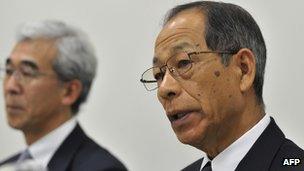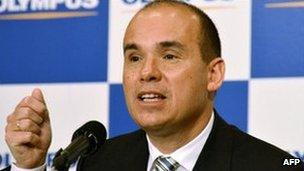What next for Olympus and its shareholders?
- Published

There has been increasing pressure on Olympus chairman Mr Kikukawa to reveal more information
It has been a bloodbath to say the least. Shares of Olympus have plummeted more than 50% over the past seven trading sessions to their lowest level in 13 years, wiping out more than $4.5bn (£2.8bn) of the company's value.
Battered and bruised, shareholders of the Japanese camera and medical equipment maker have been waiting for the rot to end, but unfortunately for them, things have only gone from bad to worse.
It all started when the company fired its chief executive Michael Woodford for what it called a divergence from the board's management policies.
However, Mr Woodford claimed that he was axed for questioning Olympus' payment of $687m as fees to financial advisors during the acquisition of British medical equipment company Gyrus.
The fee translates to almost 36% of the $2bn that Olympus paid for the takeover, compared with the industry practice of 1% to 5%.
While Olympus has denied any wrongdoing, the plunge in its share price indicates that markets and investors do want much more than just a denial.
To make matters worse, there are reports that the US Federal Bureau of Investigation is looking into the payments.
As Olympus grapples with the aftermath of the controversy, questions are being asked about the future course of action at the company.
Management change
The Olympus management have done little to ease shareholder concerns. In fact contradictory statements from the company's top echelons have only compounded the confusion.
Last week, Olympus first claimed that it had paid less than $300m as fees to the advisors. However, in a statement on its website, external the company published payment details, which suggest that the total amount paid was $687m, as claimed by Mr Woodford.
Analysts say that given the controversy, another change in management may be the first step in winning back investor and market confidence.
"What they had been doing was very opaque and now all of this is coming out," says Martin Schulz of Fujitsu Research Institute.
"Someone has to take responsibility by kickstarting the investigation and making room for it," he adds. "There is basically no other way out in such a situation."
But some analysts warn that this may not be an easy task, given the structure of the company.
"Most of the board members are handpicked by the chairman and they may not be go against him," says Yuuki Sakurai of Fukoku Capital Management.
However, Mr Sakurai argues that while the management may resist a restructuring right now, things will change if the Japanese authorities launch a formal investigation into the company.
"As board members they have the responsibility to act independently under the Japanese law."
Spinning off
The controversy has come at a time when Olympus is witnessing contrasting fortunes for its various businesses.
While it continues to grow and has become one of the biggest players in the medical equipment business, its camera division has been losing ground to the competition.
Analysts say the company may use this opportunity to spin-off its more profitable businesses.
"Their medical division is doing very well. This might be a way of bringing back some of the lost value of the company," says Marc Einstein of Frost & Sullivan.
He explains that separating the more profitable business under a different management team may help the company regain investor trust. At the same time, the move may allow the company to restructure its camera making unit to try and regain some of the lost market share.
"You might see them reach out to other Japanese camera makers, to have a joint venture of some kind, to try and augment that business," says Mr Einstein.
Mr Einstein believes that if carried out properly, the move may help Olympus restructure all its units to its benefit.
"In this case, the sum of parts could be greater than the whole."
Takeover target?
The steep slide in its share price has seen Olympus lose more than half of its market value. There are fears that if not resolved quickly, the current controversy may see its market capitalisation drop even further.
Given the huge market share Olympus has in some segments of the global medical equipment business, all this has triggered speculation that the company could become a takeover target.

Mr Woodford has claimed he was fired for questioning payments and certain accounting practices
Olympus' share of the endoscope market is three times that of all its competitors combined.
However, analysts say that despite the attractive valuation, a takeover attempt is unlikely, not least due to the current problems.
"You can't just be too sure whether the current valuation is really cheap," says Mr Sakurai.
"You would be buying not only the good parts of the company but also the unknown elements."
Analysts say the controversy surrounding the payments has raised concerns about the practices at not just Olympus but also about the health of the companies it has acquired.
"To become a takeover target, it will have to present a clean slate. No international investor will like to take over a company in such a mess," warns Mr Schulz of Fujitsu Research.
Watch list
Olympus' former chief executive Michael Woodford claims that he has notified authorities in Japan and the UK, asking them to investigate.
For its part, Olympus has said that it will ask a third party to probe the matter.
While a formal investigation by authorities has yet to be launched, the Tokyo Stock Exchange, where Olympus is listed, has urged the company to disclose more information about the fee payments.
The exchange also says that it will closely follow the third-party probe into the controversy.
The exchange has the power to place the stock on a watch list. Analysts say any such move would be a big blow for the company and may see its value plummet even further.
"Once on the watch list, its nearly the end of the game," says Mr Sakurai of Fukoku Capital Management. "Nobody wants to even touch companies on the watch list."
The BBC's Roland Buerk explains why the firm has been engulfed by crisis in a such a short time.
- Published20 October 2011
- Published19 October 2011
- Published17 October 2011